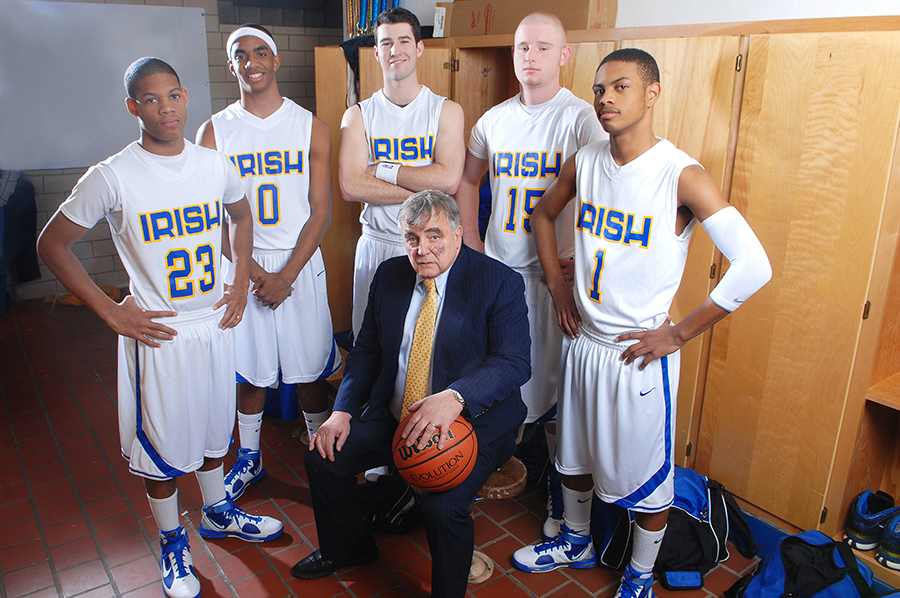Huntington business icon Marshall Reynolds steps out of the boardroom and onto the basketball court to see if he has what it takes to coach high school basketball.
By Keith Morehouse
HQ 69 | WINTER/SPRING 2010
Marshall Reynolds doesn’t take appointments. If you want to see Huntington’s über-successful businessman, you go through his administrative assistant Ruth Cline, and you take your chances. It’s not because he is some kind of megalomaniac, not because he thinks his visitors are unworthy of his counsel; it’s because he’s a busy man and he’s never entirely sure when he’ll be in his office.
As you enter his modest surroundings at Chapman Printing, you hopscotch around some paperwork on the floor that has been relegated to the not-so-important section of his carpeted office. You quickly discover that there is an aura to this man and his environs, that this is a room where big business takes place.

He’s always knee-deep in a hectic schedule at Champion Industries, where Reynolds oversees 15 companies and countless other business holdings. But last summer, Marshall Reynolds decided he’d add something to his bucket list. He wanted to become a high school basketball coach. More specifically, a coach at St. Joseph Central Catholic High School in downtown Huntington. In the mid 1950s Reynolds played basketball at Vinson High School for a coach he idolized. Bob Koontz was Marshall University’s all-time leading scorer until Walt Walowac took the record away from him. It was under Coach Koontz that Reynolds began a lifelong courtship with the game of basketball. Fifty-five years later, Reynolds would come calling on the game again.
Why now? Why would a 73-year-old multi-millionaire, after a lifetime of acquiring a business empire and spreading his companies across the globe, want to add the title “basketball coach” to his resume? What on earth do a boardroom and a locker room have in common anyway?
“It was something I always wanted to do,” Reynolds said. “I knew it would be tough on my schedule, but I was going to figure out a way to do it. My brother David wanted to help coach, and he could cover for me when I had to be out of town.”
Reynolds has a sense of humor, but he wasn’t joking about this coaching business.
“His passion has always been basketball,” said former Marshall football coach and long-time friend Bob Pruett. “If anybody knows Marshall Reynolds, you know it’s going to be done right, it’s going to be done first-class and he’s going to be successful because he’s a winner. Just ask all the people in this community that he’s helped along the way. There are a lot of millionaires running around here because of him.”
But it takes more than vaults full of money and the Reynolds name to become a basketball coach. This would require the blessing of a higher power. A fatherly chat would be in order.
“We went to lunch together to talk about it,” recalled Monsignor Lawrence Luciana from St. Joseph’s parish. “He told me, ‘I need a job,’ and I laughed. I asked him, ‘Could you spare the time?’ He said I can be there 99 percent of the time.'”

A priest is a pretty good judge of character, and Monsignor Luciana could tell right away that Reynolds wasn’t just hoping to succeed on a wing and a prayer. This was something he was sincere about.
“I was convinced he wanted to do it,” Monsignor Luciana said. “He’s always been a success, he’s given of himself and he’s a good man, an honest man.”
Now it was time for Reynolds to use his business acumen and try to transfer that knowledge to basketball. His quarterly profits would now be measured eight minutes at a time, at tiny, out-of-the-way basketball gyms throughout West Virginia. Reynolds was ready for a brand new challenge, and when he wants controlling interest in a project he usually gets it.
Leave it to the skeptics to wonder aloud if he ever really planned on coaching. The whispers were out there, wondering if Reynolds would just hand over the reins to the team and occasionally show up to a practice or a game. He’s missed one practice just the first half of the season and hasn’t missed a game. What kind of example would that set if he expects his players to be at the gym when he’s not even going to be there?
“It’s very important,” Reynolds said about being more than just a figurehead coach. “I’ve got to give it a high priority so the players give it a high priority.”
His players have taken that commitment to the bank.

“It was definitely a surprise, being such a high-profile guy, that he’d have time to donate,” said senior Lance West. “But he’s done a very good job with the time commitment; he’s always there whenever we need him to be there. He’ll even get in there and shoot layups sometimes; it’s not pretty, but he’s very hands-on.”
Reynolds has that same indefatigable spirit whether he’s talking about takeovers or turnovers. He doesn’t dive into a venture unless he thinks it can be a success. St. Joseph’s Fighting Irish spent much of the early part of its season ranked in the Top 5 in Class A in West Virginia. Reynolds’ early successes meant he was quoted in the very newspaper that he owns, The Herald-Dispatch. You would think an 8-1 start would be pretty satisfying.
“Not really,” said Coach Reynolds without a trace of a smile. “I thought we’d be undefeated after nine games. I have to blame that loss on the coach.”
Reynolds’ dream of a state title ended in Mingo County where the Gilbert Lions beat the Irish 51-42 in the regional final. The Irish ended the season at an impressive 17-5.
Beyond an array of pictures in his office of the various stages of Reynolds’ life, one framed image behind his chair catches your eye. It’s a movie still from the baseball film The Sandlot. It’s the story of a bunch of kids who grew up in the 1960s and made a lifetime of memories on their neighborhood baseball field. This coaching job might be Reynolds’ way of channeling the little kid in him again.
How long can he make a go at this? Will he be back next season? When will he ever take a rest?
“I took a leave and rescheduled some things,” Reynolds said before the season began. “After I get through the year I’ll know how difficult it is. Obviously I’m going to finish this year if I have to stand on my head and stack bee bees. Work is only work if you’d rather be doing something else. Coaching St. Joe isn’t going to be work, because this is something I’ve always wanted to do.
“They say we’re the sum total of all of our experiences, and I’m sure that when this year’s over, I’ll be a richer person for having done this.”
Richer in more ways than one.
“I demanded to be paid,” Reynolds said. “I told them I’d take a dollar a year. I’ve gotta have a salary.”
He hasn’t been paid yet.
“I haven’t earned it yet,” he said.
That’s Marshall Reynolds. Always taking care of business.





